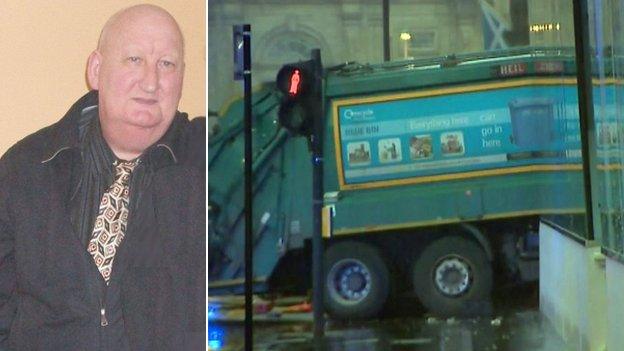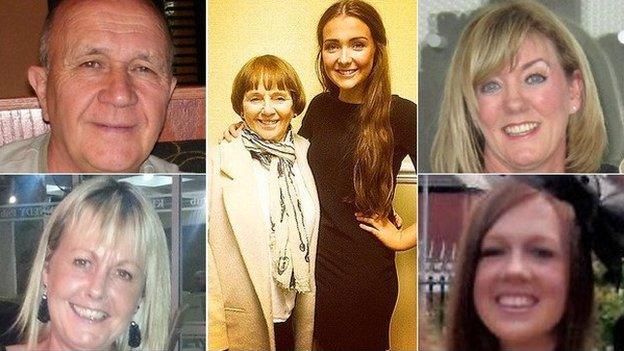Glasgow bin lorry crash: 'Lack of diligence' from medics
- Published

Harry Clarke has been told he will not face criminal charges over the crash
The inquiry into the Glasgow bin lorry crash which killed six people last year has heard of a "lack of due diligence" from doctors in relation to the driver.
The inquiry was told Harry Clarke, 58, had been unconscious at the wheel of a bus in 2010 and during the bin lorry crash in December last year.
Expert witness Dr Ronald Neville told the inquiry doctors did not note differing accounts of the 2010 episode.
Mr Clarke told his GP he had fainted in the work canteen at First Bus.
But the First Bus doctor was aware this happened while he was at the wheel of the bus.
Six people died and 15 others were injured when the Glasgow City Council bin lorry veered out of control on Queen Street before crashing into the Millennium Hotel in George Square in December 2014.
GP letters
The fatal accident inquiry (FAI) at Glasgow Sheriff Court is examining Mr Clarke's health, the condition of the lorry and the route taken.
The court had previously heard that following the 2010 blackout when he was a bus driver, Mr Clarke was examined by Dr Kenneth Lyons, the medical advisor to First Bus.
Dr Lyons subsequently sent a letter to Mr Clarke's own GP, which described how his loss of consciousness took place on a stationary bus and asked for further advice.
Mr Clarke's GP, Dr Gerard McKaig, told the inquiry that the driver had said to him that he had fainted in the First Bus canteen.

(Clockwise from top left) Jack Sweeney, Lorraine Sweeney, Erin McQuade, Jacqueline Morton, Stephenie Tait and Gillian Ewing were killed in the crash
After he went on annual leave, Dr Lyons received a response to his letter from a Dr John Langan, who worked at the same practice as Dr McKaig.
The letter said Mr Clarke had been "waiting for his lunch in a hot environment" when he fainted, and the driver was "unlikely to have another one".
It concluded Mr Clarke was "fit to return to work as a bus driver".
On Tuesday, the inquiry heard a second day of evidence from Dr Neville, a GP in Dundee, who also prepares expert reports on drivers' fitness to drive.
'Major discrepancy'
He prepared a report on Mr Clarke after the bin lorry crash.
Dr Neville told the inquiry that the "major discrepancy" in reports about the 2010 episode should have been caught by doctors.
The expert witness said the letter that came back from Mr Clarke's GP's surgery lacked the detail or thoroughness you would expect from a healthcare professional.
He said the First Bus doctor should have noted the major discrepancy in the account of the 2010 blackout and he should have got in touch with the other doctor.
Dr Neville said that if either doctor had noted the discrepancy in Mr Clarke's account, an inquiry into the exact facts would have resulted.
Erin McQuade, 18, her grandparents Jack Sweeney, 68, and his 69-year-old wife Lorraine, all from Dumbarton, died in the bin lorry crash.
Stephenie Tait, 29, and Jacqueline Morton, 51, both from Glasgow, and Gillian Ewing, 52, from Edinburgh, were also killed.
The Crown Office has already concluded that there will be no criminal prosecution over the crash, with senior lawyers deeming it a "tragic accident".
The inquiry continues.